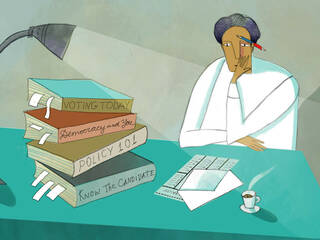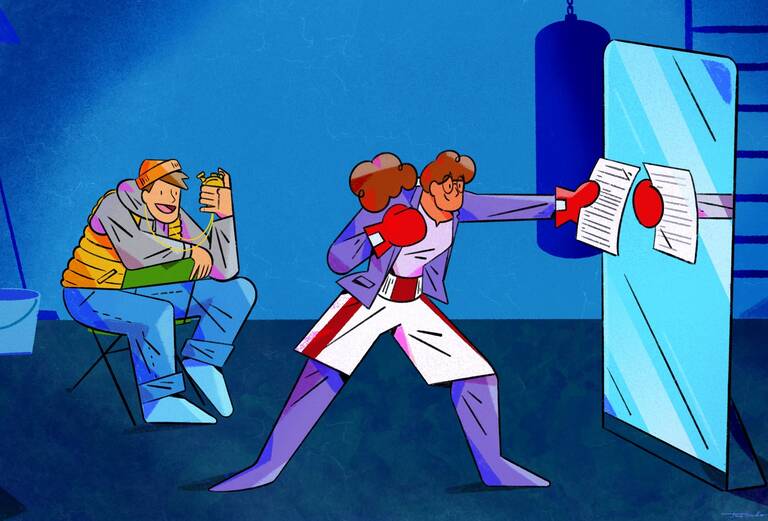
Leadership
Leaders, Do You Have a “Climate Capable” Mindset?
“We are going to have to be as transformative as the Industrial Revolution, but we have thirty years to do it rather than 150.”

Entrepreneurship
Psychedelic-Assisted Therapy Is Going Mainstream. How Will the Industry Grow Around It?
While significant barriers remain—including regulatory uncertainty and the difficulty of scaling a labor-intensive treatment method—industry leaders see a path forward.

Marketing
How Much Evidence Do You Need to Make a Decision? Depends on Your Mindset.
When a choice is framed as a responsibility, we’ll go the extra mile to be accurate—even when it costs us.
Policy
AI Has Entered the Court. Is This Changing Umpires’ Calls?
The Hawk-Eye review system in professional tennis has made umpires more accurate in many cases—but not all.

Finance & Accounting
The Hedge Fund in Your Pantry
Many households utilize excess cash to support shopping habits that generate high financial returns.
Marketing
The Future of Targeted Advertising in a Cookie-less World
Apple’s and Google’s responses to regulatory shifts may end up squeezing out small online retailers.

Finance & Accounting
Do Green Bonds Actually Lead to Rosy Returns?
And are the companies that issue them truly addressing climate issues? New research investigates.

Organizations
Why Artists Are Punished More Harshly Than Scientists for the Same Misconduct
It’s tough to separate the artist from the art, a new study finds—but easier to separate the scientist from the science.
Kellogg Insight on LinkedIn
For the latest Kellogg faculty research and expertise, exclusive content, and the chance to connect with Insight readers, follow us on our LinkedIn page.

Entrepreneurship
Psychedelic-Assisted Therapy Is Going Mainstream. How Will the Industry Grow Around It?
While significant barriers remain—including regulatory uncertainty and the difficulty of scaling a labor-intensive treatment method—industry leaders see a path forward.

Marketing
How Much Evidence Do You Need to Make a Decision? Depends on Your Mindset.
When a choice is framed as a responsibility, we’ll go the extra mile to be accurate—even when it costs us.
Policy
AI Has Entered the Court. Is This Changing Umpires’ Calls?
The Hawk-Eye review system in professional tennis has made umpires more accurate in many cases—but not all.

Finance & Accounting
The Hedge Fund in Your Pantry
Many households utilize excess cash to support shopping habits that generate high financial returns.
Marketing
The Future of Targeted Advertising in a Cookie-less World
Apple’s and Google’s responses to regulatory shifts may end up squeezing out small online retailers.

Finance & Accounting
Do Green Bonds Actually Lead to Rosy Returns?
And are the companies that issue them truly addressing climate issues? New research investigates.

Organizations
Why Artists Are Punished More Harshly Than Scientists for the Same Misconduct
It’s tough to separate the artist from the art, a new study finds—but easier to separate the scientist from the science.
Careers
The Path to the Boardroom Can Be Opaque. Here’s a Roadmap.
An expert offers 6 tips for becoming board-ready.
Humanizing the U.S.–China Relationship
Escalating tensions between U.S. and Chinese governments make preserving in-person interactions between ordinary Chinese and Americans even more important.
Finance & Accounting
What Would a Capital One–Discover Deal Really Mean?
A financial expert considers the acquisition’s potential impact on credit-card networks, merchants, and consumers.
Marketing
When Persuading a Group, Beware the Allure of Consensus
We tend to favor strategies that win broad-but-weak support over narrow-but-strong support—and this preference can lead us astray.
Marketing
How to Grow in a Multichannel World
As e-commerce continues to expand, companies need to adapt their channel strategies to stay relevant. A marketing expert offers guidance for reaching customers.
Economics
When New Technology Arrives, Who Wins and Who Loses?
For tools that assist but don’t replace workers, novices benefit, while experienced employees take a hit.
Strategy
What Game Theory Can Teach Us about RICO Prosecutions
“If you’re on trial with 17 other people, the fear that somebody else will confess becomes much more realistic.”
Politics & Elections
How Trolls Poison Political Discussions for Everyone Else
Online political debate isn’t inherently toxic, a new study of Reddit commenters finds. Instead, it becomes toxic because of the kind of commenters who opt in.
Economics
How to Award Contracts When You’re Concerned about Quality
You want a good price, but you don’t want lousy workmanship. What’s a buyer to do?
Finance & Accounting
The Dos and Don’ts of Regulating AI
How can governments capitalize on AI’s benefits while minimizing its dangers? New research examines several policies—and identifies a promising approach.
Organizations
Organizations Are Complex. Complexity Science Can Help Us Understand Them.
You can’t study the behavior of a flock by looking at individual birds. It’s time to bring that holistic approach to the social sciences, too.
Healthcare
What Happens When We Give Doctors an AI Assistant?
Machine-learning systems can improve physicians’ accuracy at diagnosing dermatological diseases. But even with AI assistance, physicians struggle to close the accuracy gap between light- and dark-skinned patients.
Policy
The Truth about U.S. Immigration
It is possible both to maximize the benefits of immigration and still maintain border security and support workers in sectors that immigrants may enter.
Latest Podcast Episodes

Leadership
Podcast: What’s It Take to Get on a Board, Anyway?
It’s not like applying for a job. On this episode of The Insightful Leader, an expert demystifies the process.

Leadership
Podcast: AI Is a Tool. How Do We Want to Use It?
Generative AI is like “a hammer looking for a nail.” On this episode of The Insightful Leader: we have to decide what the nail should be.

Leadership
Podcast: Need to Make a Point? Tell a Good Story.
Plus: more leadership advice in this episode of The Insightful Leader’s “Ask Insight” series.

Marketing
Podcast: Need Product Inspiration? Meet Your Customer in the Wild.
On this episode of The Insightful Leader: a consumer anthropologist takes us behind the scenes as she interviews a “pet parent.”

Organizations
How Will AI Reshape Our World? It’s Really Up to Us.
We need to be proactive to ensure AI supports—rather than supplants—human priorities.

Organizations
4 Tips for Managing the Succession Challenge
Generational transitions can be bumpy for family firms. They can also be an opportunity to grow.

Economics
Why Are So Many Young Chinese Depressed?
It’s not just the economic slowdown. The country’s education system and social policies have created a disillusioned generation.

Social Impact
Community Revitalization Is Hard to Get Right. Here’s How It Can Succeed.
“The basic amenities people want are pretty universal, but every community has its own priorities and ideals.”

Finance & Accounting
Who Pays for All Those Generous Credit-Card Rewards?
A new study investigates where this “free” money is coming from—and why credit-card companies are so keen to dole it out.

Finance & Accounting
How Should Global Cities Manage an Influx of Wealthy Foreign Residents?
In an age of remote work, the trend will only continue. So how can governments take advantage of the benefits while mitigating the harms?

Marketing
Here’s a Cost-Effective Way to Tell If Your Digital Ads Are Working
Running even a small number of experiments can reveal a lot, a new study finds.

Organizations
Take 5: What Does It Take to Make a Small Business Work?
The challenges are big. So are the opportunities.
Editor’s Picks

Innovation
Not Sure Where to Start with Your AI Strategy? Here Are 3 Steps
Companies across the economy are harnessing AI for a variety of functions in their businesses, with some further along in their strategies than others.

Strategy
Investing Over-the-Counter—and Under the Radar
In most markets, buyers and sellers benefit from soliciting many offers. New research shows why the opposite is true for OTC traders.

Entrepreneurship
Preparing for an Investor Meeting? Here’s How to Position Your Startup
An entrepreneurship expert—and longtime investor—offers advice for making your company attractive, whether the market is hot or cold.

Marketing
A Better Way to Measure Customers’ Willingness to Pay
Determining what customers will spend on your product is one of marketing’s oldest challenges. But “current methods don’t consider context and competition the way they should.”
Add Insight
to your inbox.
We’ll send you one email a week with content you actually want to read, curated by the Insight team.

Marketing
5 Mindsets That Drive Consumer Behavior
“Fixed” and “growth” aren’t the only mindsets out there. A Kellogg marketing professor explains the surprising ways that our mental states can influence what we buy.

Finance & Accounting
How Much Do Job Vacancies Hurt a Company’s Bottom Line?
Quite a bit, a new study shows—and large organizations aren’t immune to the toll on both sales and profits.
Organizations
Yoga Classes? On-Site Childcare? Firms Just Outside the Fortune 500 Work Hard to Attract Talent.
To compete with their prestigious peers, these organizations invest more in employees, research shows.
Economics
The Long Tail of China’s Zero-COVID Policy
As the costs of China’s pandemic experience are tallied, younger generations are confronting a disconcerting new reality.
Social Impact
Take 5: The Psychology of Charitable Giving
What makes us give? Research reveals the surprising factors that shape our generosity.
Marketing
The Surprising Role of … Surprise … in Hypocrisy
What makes a choice seem hypocritical? New research finds that unexpectedness is an important factor.
Marketing
3 Priorities for Today’s Marketing Leaders
A roundtable of experts weighs in on trends and challenges in a time of radical industry shifts.
Finance & Accounting
Crypto Had a Brutal Year. What Comes Next?
“There’s definitely more caution now, which might not be a bad thing.”
Social Impact
The Big Trade-off at the Heart of Generative AI
Tools like ChatGPT can improve efficiency at the individual level—but could lead to large societal problems.
Finance & Accounting
When Your Savings Account Is Also a Lottery Ticket
Prize-linked savings accounts can be more enticing to customers than interest rates—and banks like them, too.
Finance & Accounting
In a Warming U.S., Smaller Manufacturers Are Feeling the Heat
Smaller firms struggle in the face of temperature shocks, while larger ones are less affected—a trend that is driving industry consolidation.
Organizations
How Have Social Stereotypes Changed over the Last Century?
The words people associate with different social groups have shifted, but the underlying beliefs may be more stubborn.
Marketing
Podcast: Need Product Inspiration? Meet Your Customer in the Wild.
On this episode of The Insightful Leader: a consumer anthropologist takes us behind the scenes as she interviews a “pet parent.”
Economics
When New Technology Arrives, Who Wins and Who Loses?
For tools that assist but don’t replace workers, novices benefit, while experienced employees take a hit.
Politics & Elections
How Trolls Poison Political Discussions for Everyone Else
Online political debate isn’t inherently toxic, a new study of Reddit commenters finds. Instead, it becomes toxic because of the kind of commenters who opt in.
Economics
How to Award Contracts When You’re Concerned about Quality
You want a good price, but you don’t want lousy workmanship. What’s a buyer to do?
Healthcare
Video: Understanding America’s Prescription Drug Market
A healthcare economist answers questions about pharmaceutical innovation, costs, and more.
Finance & Accounting
The Dos and Don’ts of Regulating AI
How can governments capitalize on AI’s benefits while minimizing its dangers? New research examines several policies—and identifies a promising approach.

Policy
What’s at Stake in the UFC Antitrust Case?
The outcome of the mixed-martial-arts saga could have wide-ranging implications for the future of global sports entertainment.
Data Analytics
Podcast: Can Complexity Science Help Us Understand Organizations?
On this episode of The Insightful Leader: From climate change to neuroscience, this new approach is reshaping how we study complicated systems.

Organizations
Organizations Are Complex. Complexity Science Can Help Us Understand Them.
You can’t study the behavior of a flock by looking at individual birds. It’s time to bring that holistic approach to the social sciences, too.
Healthcare
What Happens When We Give Doctors an AI Assistant?
Machine-learning systems can improve physicians’ accuracy at diagnosing dermatological diseases. But even with AI assistance, physicians struggle to close the accuracy gap between light- and dark-skinned patients.
Podcast: The Complicated Promise of ESG
On this episode of The Insightful Leader: Are companies as socially responsible as they claim? And how much should investors care?
Organizations
Could Remote Work Hurt On-the-Job Learning?
We are more likely to learn from our collaborators when we are in close proximity to them, a new study finds.
Organizations
Are Whistleblowers Seen as Heroes or Snitches? It Depends.
Reporting workplace misconduct often requires choosing between morality and loyalty. New research explores how that trade-off is viewed by others.

Economics
How the Railroad Laid the Tracks for Modern Government
Technologies that allowed federal officials to monitor workers from afar played a key role in the emergence of the bureaucratic state.

Leadership
Want to Connect with Your Audience? Stop Trying to Impress Them
Good ideas and technical expertise alone won’t cut it. An expert offers four tips on giving a great presentation.
Social Impact
What’s Behind the Rush to Join an Internet Pile-on?
A new study investigates the reputational rewards of publicly condemning others before getting the whole story.
Finance & Accounting
ESG Risks Can Lurk in Supply Chains, Too
Most companies know little of their suppliers’ ESG practices. But negative incidents can sway stock prices—and investors should take note.
Organizations
How Will AI Reshape Our World? It’s Really Up to Us.
We need to be proactive to ensure AI supports—rather than supplants—human priorities.
Podcast: How Should You Present Yourself at Work?
Be yourself! No, not like that. On this episode of The Insightful Leader, we help you navigate the competing advice about how much to share and hold back.
Organizations
4 Tips for Managing the Succession Challenge
Generational transitions can be bumpy for family firms. They can also be an opportunity to grow.
